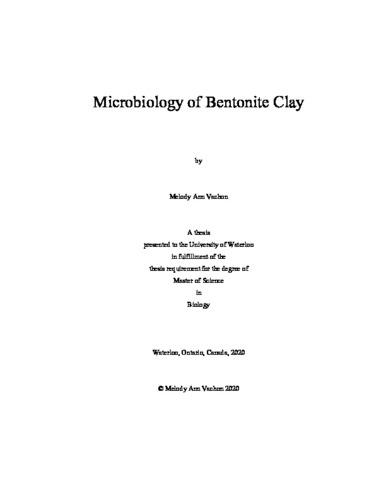| dc.description.abstract | Highly compacted bentonite clay has been proposed as an important engineered barrier component of a deep geological repository for Canada’s high-level nuclear fuel waste. As a result, the microbiology of bentonite clay is relevant for the long-term stability of such a repository. Understanding microbial communities in “time-zero” clay samples and detection of temporal changes to clay microbial communities in experiments that mimic repository conditions, are essential for predicting how microbial activity within the barrier system may influence corrosion of other barrier components. The microbial communities contained within bentonite clay have traditionally been studied using culture-dependent detection methods. The difficulty associated with adsorption of DNA to the clay matrix has resulted in relatively few reports involving extraction and high-throughput sequencing of nucleic acids directly from mined bentonite clay.
Circumventing longstanding barriers to cultivation-independent analysis of nucleic acids with a recently validated method, this research used DNA extraction and high-throughput sequencing to explore nucleic acid profiles in multiple representative bentonite clay samples. Assessment of 16S rRNA gene profiles from clay samples reveals heterogeneity among bentonite clay sources and dates. Microbial 16S rRNA gene profiles for clay samples and corresponding cultures selecting for sulfate-reducing bacteria, denitrifying bacteria, and heterotrophic bacteria revealed distinct microbial community profiles. The ASVs detected in both bentonite clay DNA and enrichment culture DNA profiles were primarily associated with desiccation-resistant taxa, including those affiliated with Streptomyces, Micrococcaceae, Bacillus, and Desulfosporosinus.
Using oxic pressure cells with saturated bentonite clay, this research used cultivation-based approaches and nucleic acid profiling to assess the microbiology of pressure vessels containing compacted Wyoming MX-80 bentonite at dry densities of 1.1, 1.4, and 1.6 g/cm3 for durations of 1, 3, and 6 months. The data show that some outer layers of bentonite clay provided more favourable conditions for growth of clay microorganisms than inner layers. In addition, low dry density conditions (i.e., 1.1 and 1.4 g/cm3) increased the average abundances of culturable heterotrophic aerobes without a corresponding increase in culturable sulfate-reducing bacteria. Sequencing of 16S rRNA genes agreed with cultivation data and confirmed that putative heterotrophic bacteria (associated primarily with Bacillus and Pseudomonas) proliferated in clay pressure vessels at the lowest dry density, but not for those in high dry density (1.6 g/cm3). These preliminary results reinforce that microbial growth is prevented, at least over relatively short incubation times, in dry density bentonite clay conditions similar to those proposed for use in a deep geological repository. In addition, the use of cultivation-dependent and cultivation-independent approaches provides an effective and complementary methodological combination for monitoring future experiments that mimic engineered barrier conditions to assess potential microbiology implications for a deep geological repository. | en |

